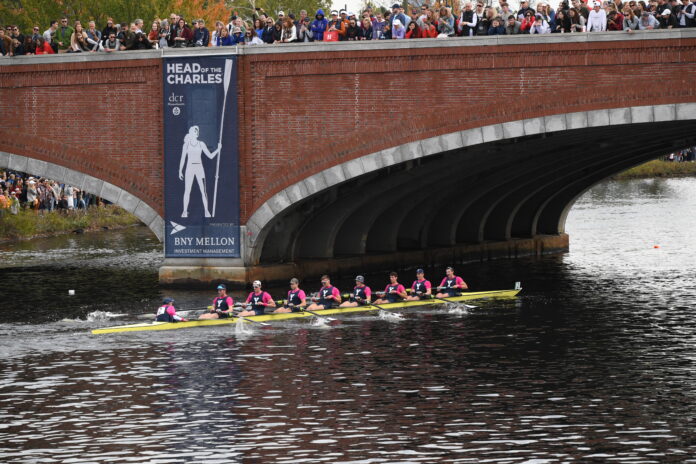BY ED MORAN
PHOTO BY PETER SPURRIER
To continue reading…
This article is exclusively for Rowing News subscribers. For as little as $5 a month, you can get access to the best quality, independent reporting on all the issues that matter to the North American rowing community.
Already a subscriber? Login
First came the news that Stanford University was cutting 11 varsity sports, including men’s rowing and women’s lightweight rowing, as a direct result of the financial losses suffered during the spring pandemic shutdown that closed schools across the country and forced the cancellation of all spring sports seasons.
That midday Wednesday announcement was followed a few hours later by the news that the Ivy League had reached a decision to cancel all fall sports. It was a decision that had been anticipated – and expected – but was no less easy to accept.
The official announcement did not come immediately, but the news nonetheless was being reported by multiple organizations citing sources who said the eight member schools had been informed.
According to those early reports, all fall sports are canceled and a decision on when winter sports might return would come later in the year. The reports also suggested that there is potential to move the football season to the spring, a switch that has been talked about for weeks.
Those early reports became official late afternoon when the league posted their decision on their web page.
The decision made will keep the Ivy League out of fall collegiate sports:
“With the safety and well-being of students as their highest priority, Ivy League institutions are implementing campus-wide policies including restrictions on student and staff travel, requirements for social distancing, limits on group gatherings, and regulations for visitors to campus. As athletics is expected to operate consistent with campus policies, it will not be possible for Ivy League teams to participate in intercollegiate athletics competition prior to the end of the fall semester.
“Practice and other athletic training opportunities for enrolled student-athletes will be permitted provided they are structured in accordance with each institution’s procedures and applicable state regulations.
“The Ivy League will also issue guidelines on a phased approach to conditioning and practice activities to allow for interaction among student-athletes and coaches that will begin with limited individual and small group workouts and build to small group practice sessions, if public health conditions permit,” the league post stated.
If the Ivy League action is followed anything like what took place this spring, the rest of the collegiate conferences will soon make similar moves.
Beyond what that will mean for the students who participate in fall championship seasons, the announcement will also impact the college rowing teams that row in the fall regattas. And that should have a downward effect on those events themselves.
The Head of the Charles Regatta relies heavily on collegiate entries, and on the college boat houses that line the Charles River to have the success it has enjoyed for so many years. It is unlikely the regatta can be staged if the boathouses are closed.
Regatta officials have not made a decision and have maintained that the call to cancel the regatta or try to hold some form of hybrid event will not come until the end of July.
But just the fact that the Ivy League has shut down and that the virus is spiking to levels above those that forced the country into complete shutdown earlier this year, does not bode well for a fall rowing season.
Hours before the news of the Ivy League decision began to trickle out, Stanford University dropped the shocking news that it was cutting 11 varsity sports programs, including men’s rowing and women’s lightweight rowing.

The announcement was made during a Zoom call to student-athletes and staff by the Stanford athletic department and Stanford Board of Trustees. A detailed explanation of the actions is posted on the Stanford Athletics page.
The 11 programs cut include men’s and women’s fencing, field hockey, lightweight rowing, men’s rowing, co-ed and women’s sailing, squash, synchronized swimming, men’s volleyball and wrestling.
“We understand that the timing of this announcement, in early summer and against a backdrop of uncertainty and change across our country, is certainly far from ideal, as is the method by which we had to deliver the news to our student-athletes and coaches today, via Zoom,” the university wrote.
However, the cuts were “imperative to confront the financial challenge before it worsened, to undertake a deliberate and collaborative decision-making process with our Board of Trustees and campus leadership, and to exhaust all viable alternatives before making profound changes in our programs, especially during this difficult time.
“The decision to discontinue these 11 varsity sports programs comes down primarily to finances and competitive excellence. With so many varsity sports and limited financial resources, we would no longer be able to support a world-class athletics experience for our student-athletes without making these changes.”
The cuts will impact 240 student-athletes, 22 coaches, and will eliminate 20 staff positions from the athletic department. Stanford’s announcement also made clear that outside funding would not save the cuts from taking place.
“The decisions to reduce our sports offerings are final, and any future philanthropic interest in these sports may be directed towards supporting them at the club level, should they establish as a club sport after their 2020-21 varsity campaign,” the announcement stated.
“While Stanford Athletics has many tremendously generous donors, their support simply could not cover the escalating costs of ensuring excellence across the board in our 36-sport model.”
Stanford’s decision comes weeks after North Park University in Chicago, Illinois, Ohio Wesleyan University in Delaware, Ohio, and the University of Connecticut in Mansfield, Connecticut, eliminated their rowing programs.

